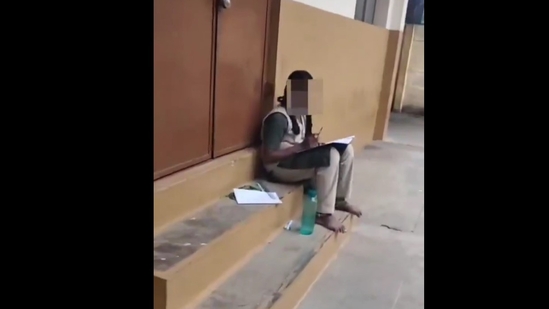Tamil Nadu Dalit student on period forced to take the exam outside the classroom
The parents' complaint has led to an investigation: "It is a double discrimination," said Fr Devasagayaraj Zackarias. Tamil Nadu's Minister of Education stands with the student. But in India, the social stigma associated with the menstrual period and the weight of the caste system are still strong.
New Delhi (AsiaNews) – A private school in Coimbatore, a district in the southern Indian state of Tamil Nadu, forced a Dalit student on her period to take the end-of-year exams sitting on the steps outside the classroom.
The incident, which took place last Wednesday at the Swamy Chidbhavananda Matric Higher Secondary School in Senguttaipalayam, was reported by the girl's father, V. Surendranath, 34.
In his complaint to the police, he said that his two daughters, aged 14 and 12, attend the school in question. The youngest, enrolled in the eighth year, had her first menstrual period on 5 April.
As a result, according to the father, she was forced to take the exams outside the classroom, both Monday and Wednesday, sitting on the steps.
A video, recorded by the girl's mother posted on social media, shows the girl writing her exam outside. In the recording, she is heard saying that the principal gave her that order.
The parents, the local press reported, had only asked that their daughter be able to sit in a separate seat inside the classroom, to feel more comfortable. But that request was interpreted as an authorisation to exclude her altogether from the school environment.
Faced with growing public outrage, Tamil Nadu's Minister for School Education Anbil Mahesh Poyyamozhi took a clear stance against the school.
"A departmental investigation was conducted against the private school. The director of the school has been suspended. The oppression of children in any form cannot be tolerated. The student did not sit alone! We are here. We will be here," he wrote in a post published on social media.
The case has revived a public debate about the persistence of two issues rooted in the Indian social system: caste divisions and the stigma of menstruation.
“It is a double discrimination. All women, irrespective of their caste, are seen as polluted during the menstrual period. As soon as they attain puberty they are made to sit outside the home in a temporary hut made for them out of coconut branches,” explained Fr Devasagayaraj Zackarias, former executive secretary of the Catholic Bishops' Conference of India, speaking to AsiaNews.
“Dalits are also considered untouchables. The Dalit girl is deemed polluted as a Dalit and because she has in her menstrual period,” he added.
Despite some legislative and social progress, including the abolition in 2018 of the 12 per cent tax on sanitary products, menstruation remains a highly stigmatised issue in India.
In many parts of the country, menstruating women and girls are still excluded from religious ceremonies and domestic activities, and are prevented from entering temples and kitchens.
According to a 2014 study conducted by Dasra, a charity committed to the health of adolescents, every year about 23 million Indian girls drop out of school due to the lack of proper menstrual hygiene management facilities.
Many educational establishments still lack accessible bathrooms, clean water, sanitary napkins, and adequate educational programmes.







.png)










